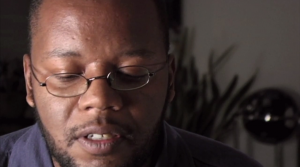Review: Times plagiarist neither damned nor redeemed by new doc
“Why did you do it?”
It’s a fitting opening to a documentary about a plagiarist, considering it’s usually the first question asked of people like Jayson Blair—who, as a reporter for The New York Times, plagiarized or fabricated more than 30 articles. The scandal, known as the “Blair Affair,” is the subject of Samantha Grant’s A Fragile Trust, which had its Canadian premiere at Bloor Cinema in Toronto earlier this week.
For the record, Blair never really answers the question. He explains how he managed to get away with large-scale intellectual theft for as long as he did, and former colleagues, fellow journalists and media critics speculate as to why he might have done it and how he could have been caught earlier. But if viewers were hoping for a clear-cut answer, there isn’t one.
Grant traces the dramatic and disturbing downfall of a once-promising intern with “raw talent” and an eager-to-please personality. Blair’s struggle with substance abuse and mental illness coincide with his rise to full-time reporter at the Times and his most brazen acts of plagiarism (“I was getting more egregious,” he acknowledges). When he was finally caught in 2003, he’d made such a mess that he took the paper he loved down with him. At the height of the scandal, the Times was eviscerated for ignoring red flags. Blair and the newspaper became the center of anti-affirmative action debates and fodder for those already skeptical of the entire industry.
Blair speaks calmly and plainly about his plagiarism and his problems with addiction. He breaks only once while recounting the day he finally came clean; otherwise, he seems nearly unaffected.
“I don’t wake up every morning thinking about it,” he says at one point, adding, “I had to let it go to live.”
Blair was eventually fired and his credibility destroyed, but there are those who don’t believe he paid enough for what he did. It doesn’t help, either, that the film can’t offer a straightforward apology from him. Grant said no one—not even those closest to him at the Times—trusts Blair’s displays of remorse.
“I have the material to create a very damning picture of Jayson Blair and I also have the material to create a redemption story,” Grant said after the screening. “Ultimately, I wanted to stand back and put the material out there for an interpretation of both.”
By relying only on interviews from those directly involved in the scandal, broader issues of journalistic ethics are left to the viewer. How unique is a person like Blair in this industry, and how much responsibility should plagiarists assume when newsrooms fail to vet stories for creative dishonesty? Should editors be held to a higher standard even when they’re up against a committed liar like Blair?
A journalist herself, Grant became the target of some resentment and frustration during the post-screening Q&A. Some questioned why Grant didn’t include more cases of plagiarism; others worried that the evolution of news would make it easier for reporters to deceive their readers. But it highlighted exactly what was at the heart of her film: that the relationship between the public and journalists is a valued but tenuous one. And it’s made even more so when a Jayson Blair comes along and seems to confirm the skeptics’ suspicions.
Remember to follow the Review and its masthead on Twitter. Email the blog editor here.














